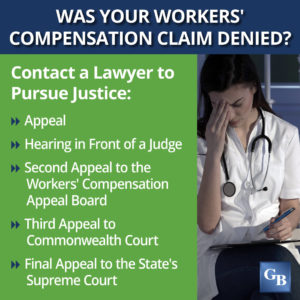Why Would a Workers’ Compensation Claim Be Denied?
In most cases, when you apply for Workers’ Compensation benefits, your employer will initially rule on your application. They will usually confer with their Workers’ Compensation insurer to decide whether to approve your application, or the insurer will flat-out deny the claim, even if it is valid.
Why would the employer or insurer deny a claim? Workers’ Compensation claims cost the company money and loss of productivity if an employee must be off work. The following are other common reasons why Workers’ Compensation claims are denied.
Injury Not Reported on Time
According to Pennsylvania law, an employee should report their injury to the employer within 21 days but no later than 120 days from the date of injury.
Injury Not Related to Work
This is a common reason for benefit denial. To be compensable, an employee must have been injured within the course and scope of their employment. Insurers will often claim that the injury or illness happened outside of work, forcing employees to use their private medical insurance, rather than Workers’ Compensation benefits. However, the law broadly defines what constitutes the course and scope of employment, especially for traveling employees.
Pre-Existing Condition
Another common reason for denying a claim is that the insurer claims you had a pre-existing condition, and therefore, the injury was not related to your job. Be aware that Workers’ Compensation covers pre-existing conditions made worse or aggravated by work responsibilities.
Injury Not That Severe
While the employer and insurer may agree you were hurt on the job, they may argue that the injury or illness was not severe and there was no need to be off work. It’s imperative that your injury be properly assessed and diagnosed so that you receive appropriate medical treatment.
Did Not See a Doctor
If you were injured at work but did not see a doctor right away or refused medical help at the time of the accident, your employer and its insurer can use this as a reason to deny benefits.
Note that you may have to go to an employer-approved doctor after a workplace accident.
Not an Employee
According to Pennsylvania law, independent contractors are not eligible for Workers’ Compensation coverage. Employers do not have to purchase coverage for them. Some employers misclassify employees as contractors to avoid paying for coverage.
No Incident Report
Be aware that you should insist on an official, written incident report at the time of the injury or soon after if you are gravely injured. Review the report before signing and get a copy for your files. While your claim cannot be denied because there was no incident report, an employer could fabricate circumstances if there is no formal documentation.
Impaired on the Job
Insurance companies may claim that you were under the influence of alcohol or drugs at the time of injury. Even if the worker had one beer at lunch or took a mild prescription medication before work, they could use this excuse.
Illegal Activity
An employer may claim you were involved in illegal activity, such as using illicit drugs, on work time. They can use this as a scare tactic to get you to back down from your claim.
Not Eligible
Some employees are not eligible for state Workers’ Compensation benefits, including federal workers, railroad workers, longshoremen, and sole proprietors.
Missing or Incorrect Information
Some claims are denied because the information provided is incorrect or some information is missing. Always check to make sure that the information that you provide to your employer and their insurance carrier is accurate.
Suspected Fraud
If the employer’s investigation reveals information counter to that provided by the employee in their report, the claim may be denied. An employer may also have contradicting video surveillance, statements from co-workers, or witness accounts.
 Google Screened
Google Screened

